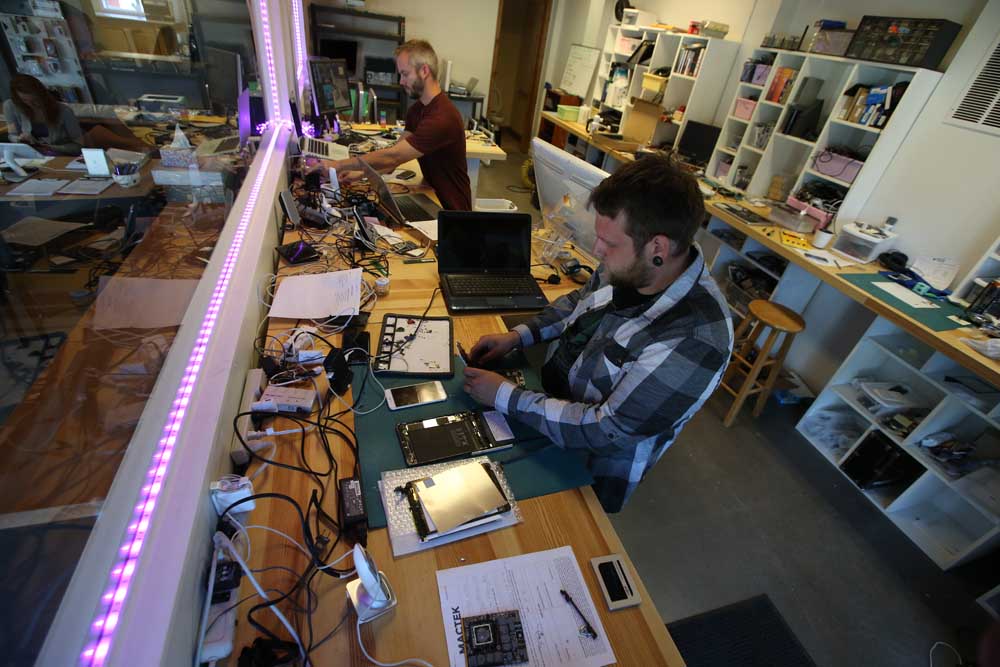Smartphone repair shops want access
Published 12:00 am Sunday, October 2, 2016

- Andy Tullis / The BulletinComputer technicians Stephen Patterson and Chris Farrar repair electronic devices at The iPhone Professor/Mactek offices in Bend.
The Samsung Galaxy S7 that came to Redmond electronics repair shop Simplify Simple last week had been dropped on a carpeted floor after about a month of ownership.
The fall shattered one edge of the $670 smartphone’s screen, and the owner didn’t have insurance to cover a replacement. So she paid $370 for a repair, which wouldn’t even restore the phone’s water-resistance, said Chris Sanford, chief technology officer of Simplify Simple, which also creates websites.
The electronics repair industry has suffered over the last few years as the price of goods declines in comparison with fixes, according to a 2015 report from Ibis World, an Australian market-research company. Sanford and many of his peers say more consumers might choose to repair rather than replace their damaged phones if manufacturers gave independent shops equal access to schematics, diagnostic codes, tools, parts and firmware, the embedded software. Represented by the Repair Association, the repair industry is pushing “fair repair” legislation in several states.
So far those efforts have been blocked by the Consumer Technology Association, which says the bills introduced in Minnesota and elsewhere could create additional product liability.
The reason it cost so much to fix that S7, Sanford said, is the replacement screen: “The price of these Samsung screens is absolutely outrageous.”
Many smartphone repair shops don’t work with Samsung phones at all because they can’t obtain enough screens, and those they do get are expensive, said Kyle Wiens, the founder of iFixit, a San Luis Obispo, California, company that publishes crowd-sourced repair manuals and sells electronics parts and toolkits.
Wiens, a Bend native, is one of the most outspoken members of the “fair repair” movement, which he describes as a “no-brainer” that supports local economies, consumer choice and environmental protection.
The issue seems to resonate especially well in rural areas, he said. “Anything that tips the scale in favor of buying a new unit is going to take local jobs away,” Wiens said.
The Repair Association is modeling its effort after a 2012 Massachusetts law that protected independent automotive repair shops. The Massachusetts law prompted automakers and the after-market parts and service industry to strike a national accord, which ensures independent shops will have the parts, tools and information needed to work with modern vehicles.
Although the increasing level of electronics in cars prompted the automotive right-to-repair movement, the automotive industry isn’t the perfect analogy for consumer electronics, said Walter Alcorn, vice president of environmental affairs at the Consumer Technology Association.
“They use thousands of different components from hundreds of suppliers in their process,” Alcorn said. “It changes quite quickly as new component suppliers come into the market, as new technologies are brought in.”
Many manufacturers just aren’t used to the idea of sharing the inner workings of their products, Alcorn said.
Allowing modifications to firmware also is a big sticking point for the association. Firmware modifications could make a product unsafe and lead to more liability for the manufacturer, Alcorn said. One of the reasons the association opposed the Minnesota bill, he said, is that it went beyond diagnostics and repair.
“It’s the right to get in there and change the product,” he said. “(A modification) might not be consistent with engineering or battery load.”
Electronics-makers are particularly concerned about the safety of lithium-ion batteries, Alcorn said. Exploding and incendiary batteries have prompted a number of lawsuits and recalls. Most recently, Samsung saw its Galaxy Note 7 recalled shortly after its release because of a faulty battery.
Cat and mouse
Tales of tinkering heroics can reach epic proportions in local shops.
Chris Farrar, lead iPhone repairman at The iPhone Professor in Bend, has fixed phones that were stepped on by horses, run over by farm trucks and taken swimming for as long as 45 minutes.
Farrar, 24, has been fixing computers and phones for 10 years. While he supports the right-to-repair movement, he doesn’t think repair work is in danger of becoming obsolete. “It’s in Apple’s best interest to keep them sort of repairable because then they couldn’t sell the warranty,” he said.
As an independent shop, The iPhone Professor’s work isn’t covered by — and could even void — Apple’s warranty, but Farrar said there are benefits to taking that risk. The iPhone Professor will work with older devices and make a wider range of repairs than an authorized servicer such as Simply Mac, a chain with a store in the Old Mill, Farrar said. That means people can hang onto their phones and laptops longer, he said.
“Apple tries to control every aspect of it,” he said. “When you buy a device from them, they don’t want you to own it. They want you to basically lease it.”
While repairmen criticize Apple’s business practices, the incredible popularity of Apple products also helps them earn a living. Asked why he works with Apple products, Farrar, who carries a Samsung smartphone, said, “They’re expensive, and people really like them.”
Central Oregon’s exploding population of retirees is helping local fix-it shops overcome the long-term trend toward disposing of electronics more often. Simplify Simple relocated from California last year and chose Redmond because of its baby boomer population, CEO Ellen Michaels said. “We do a lot of education, most of which we don’t ever charge for,” she said.
The fact that mobile broadband companies are no longer subsidizing smartphone purchases has given the repair industry a boost, said Tyler Brown, owner of The Smartphone Doc in Bend. “People hang onto phones a while longer,” he said.
It helps that he’s also the only repairman in Bend who works with video game consoles, he said. He also has access to high-end micro-soldering tools, which allow him to do more complex work.
One skill that sets Simplify Simple apart is Sanford’s ability to retrieve and back up data. In fact, sometimes that’s all he can do. On Wednesday, Sanford was mid-rant against Apple’s iron-clad grip on the supply of iPhone 6 screens when a regular customer came in with an iPad that wouldn’t start properly.
Sanford suspected malfunctioning software was the culprit, so he planned to back up the device and restart it multiple times, or restore it to factory settings. But he’ll never know the root cause of the problem. “There’s no diagnostic software on the market,” he said.
— Reporter: kmclaughlin@bendbulletin.com, 541-617-5860






